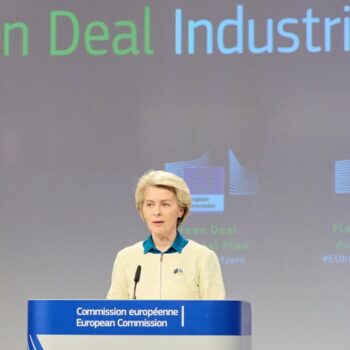The UK debate since the Brexit referendum vote has been remarkable for the absence of discussions on environmental and climate change issues. With the start of actual negotiations this is changing. The Government’s “Great Repeal Bill” White Paper disproportionately focused on the difficulty of transposing EU environment regulations into UK law. A group of Conservative MPs, backed by the Daily Telegraph, have started a campaign to roll back green protections once we have left the EU. UK environmental organisations, with a combined membership of 9 million people, have begun securing pledges from MPs to maintain and improve UK environmental protections and citizens rights. The European Commission and Parliament have signalled that preventing any environmental or social “dumping” by the UK will be a core negotiating objective.
The reality is that Brexit raises significant risks to the UK’s environmental quality at home and our ability to shape global issues like climate change which impact UK citizens, businesses and the most vulnerable people in the world.
As we enter the Brexit negotiations UK citizens will need to “mind the gap” in four critical areas: environmental protection; future cooperation; clean investment and global influence.
Brexit carries the risk of a gap emerging in UK in environmental protections and citizen’s rights. Merely copying European regulations into UK law does not guarantee a healthy environment, because transposition doesn’t automatically lead to effective enforcement. The UK government has already said it cannot transpose 30% of EU laws which rely on EU institutions to set standards, monitor performance and enforce compliance. It is not, as the UK government argues, a “technical issue” to replace EU institutions with UK ones without Parliamentary oversight but one that impacts the democratic and environmental rights of every UK citizen.
The UK government has repeatedly failed to deliver EU standards on clean air and is near the bottom of EU air quality league tables. It is only now producing credible plans because of EU enforcement rulings backed up by UK court judgements. UK environmental regulators do not have the same independence as the European Commission to enforce compliance. If the European Commission fails to hold the UK government to account then UK citizens can – and have – complained directly to the EU Ombudsman to make it do so. UK citizens have no such rights in the UK. EU law forces environmental impact assessment of major developments, and sustainability impact assessments of trade deals. This will be vital as the UK forges trade agreements with countries having lower standards, such as the US, Australia, India and China.
None of these enforcement mechanisms and rights automatically survive Brexit. Indeed judicial oversight of UK government actions is being systematically weakened. The Repeal Bill must include provisions to ensure UK citizens have the same – or better – democratic environmental rights and access to justice as under EU laws.
The UK is leaving the EU but not leaving Europe. We will continue to share a common environment – air quality, common seas, migratory species – and be linked by physical infrastructure in gas, electricity, transport and digital networks. UK citizens suffer premature deaths from EU27 air pollution every year and visa-versa. There is a danger that Brexit will create a gap in cooperation in all these areas. Legal stand still is not enough. Cooperation and alignment must be dynamic in order to adjust to changing economic, technological and environmental realities. The UK is planning a three-fold increase in electricity connections to Europe in order to support expansion of clean renewable energy while saving UK consumers hundreds of millions of pounds every year. The UK and EU will remain highly interdependent in managing direct threats from infectious diseases, food safety, animal and crop health, organised crime and terrorism. The structure of the Brexit negotiations must allows space for developing deep cooperative institutions in all these areas and not just solely focus on trade and investment issues. Environment, energy and climate change are areas of strong mutual interest for both the UK and EU which could be an area for early cooperation wins. Progress on these areas can improve the overall political atmosphere around the negotiations.
The European Investment Bank has been one of the largest investors in UK clean energy over last decade. The EIB has funded off shore wind, energy efficiency and clean transport. On leaving the EU the UK will lose access to 90% of current EIB funding. It faces a gap in clean energy finance at the very time the UK needs a massive uptick in investment in energy efficiency, clean energy, climate resilience and electric transport especially at the city-level. Negotiating to stay in the EIB is difficult but potentially possible if the UK made it a priority. Alternatively the UK could invest its share holding n the EIB into the UK Green Investment Bank or a new fund to support city level green investment.
Finally, Brexit threatens to produce a gap in UK global influence on energy and climate change. Without the EU the UK has little prospect of influencing Russia, the US and China on major energy issues. In contrast, UK has probably been the most influential country in driving global climate diplomacy over the last 20 years. This impact was possible because the UK could harness the economic weight and clean energy leadership of the EU to its diplomatic resources and high level political access. UK action has been driven by pragmatic national interests. The UK is particularly vulnerable to the global economic and security disruptions from uncontrolled climate change given its dependence on global supply chains, commodity markets and financial systems.
UK influence will be significantly diminished outside the EU, but the EU will also lose its most active and well staffed climate diplomacy capacity. The UK currently has over 120 climate diplomats while the EU External Action Service has one. Climate diplomacy could be an area to demonstrate the reality of the “Global Britain” strategy, and take a leadership role in areas of UK strength such as green finance, climate risk insurance and coal-phase out. But the UK will also need to forge a renewed partnership with the EU on climate diplomacy in order to protect its citizens from catastrophic climate change.
Without focused effort to these gaps could open up under even the most orderly and cooperative scenario for the Brexit. But there is a real risk that negotiations will not proceed smoothly and tensions over the “divorce bill” and immigration will sour relationships across the Channel. Domestic political pressures on both sides coupled with an overloaded agenda could drive the UK to “crash” out of the EU without future arrangements in place. This scenario would further empower those in the UK who want to roll back environmental protections and undermine the growth of clean energy.
The best way to avoid a crash Brexit is to build a cooperative political atmosphere around the Brexit negotiations by open dialogue with Europe over where the greatest benefits of future cooperation lie. This will require and transparent approach to negotiations and the opportunity for real oversight by the UK Parliament over all stages to the process.
In the 21st Century, agreements which impact the rights, welfare and livelihoods of citizens cannot be negotiated in windowless rooms by faceless officials. How we chose to negotiate Brexit will determine both our destination and the character of UK democracy into the future.


